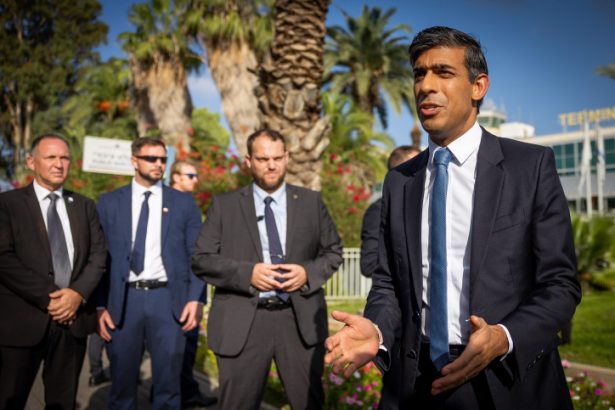Rachael Liss is the European Policy and Development Coordinator for ALLMEP, working on the design and implementation of ALLMEP’s European and UK advocacy projects. She argues that even without consensus in the international community about governance, reconstruction and final status diplomacy issues, there is broad support among the UK and its G7 and Arab allies about the need for Israeli and Palestinian civil society to rebuild strong and stable societies in the wake of so much destruction, fear and hate. The UK can and should lead the way in the creation of an International Consortium for Civil Society Peacebuilding (ICCSP).
As the crisis in the Middle East continues into the UK’s general election year, the Israeli-Palestinian conflict dominates the foreign policy agenda.
Divisions over (in)actions and statements within and across political parties have fanned the flames on both sides of this horrific conflict. In attempting to move toward a sustainable resolution, the Alliance for Middle East Peace (ALLMEP) looks to an area of rare common ground: support for civil society peacebuilders in Israel and Palestine. The International Fund for Israeli-Palestinian Peace (IFP), ALLMEP’s flagship advocacy campaign, is a multilateral body designed to coordinate and scale civil society and economic investments at a level that would disrupt the very civic, political, and attitudinal conditions which led to the horrific violence of recent months.
Considering how divisive the Israeli-Palestinian conflict can be, the IFP stands out because of its remarkable cross-party support. The UK, as the first country to endorse the IFP in May 2018, has sustained this backing, support from all major political parties remaining solid. Notably, current Prime Minister Rishi Sunak, Labour Party leader Keir Starmer and Liberal Democrat spokesperson for FCDO Layla Moran, have championed the IFP, and pledged their party’s support for its creation. During a 2020 Parliamentary debate, every participating MP, regardless of party affiliation, endorsed the concept; during the G7 in 2021, 65 Parliamentarians urged Foreign Secretary Dominic Raab to establish the fund; and in 2023, we saw this same multi-party support during a House of Lords debate when many peers called for its establishment. The only two British MPs with parents from Israel and Palestine, Layla Moran and Alex Sobel, are staunch supporters, and MPs and Lords across the political spectrum, including Stephen Crabb and Steve McCabe, Catherine McKinnell, Diana Johnson, and Lord Alderdice consistently voice their support for it in the media.
Ask yourself what other idea or initiative on this most polarising of issues enjoys the support of the three major UK political parties in the UK? The logical follow-on question ought to be, why – with governmental support since 2018, and waves of cross-party enthusiasm since – has the UK not then followed through and led on creating the IFP? The answer is that like most other governments around the world– and indeed many in the region itself– resolution of the Israeli-Palestinian conflict, prior to the devastating events of recent months, had been deprioritised. While it is worth reflecting on what might now be different had the IFP been created in 2018, it is never too late to do the right thing. This broad cross-party support can allow for very rapid action in the way that few other ideas can, and can yet push the UK to play the leading role in a new project aimed at resolving a very long-standing problem during a pivotal moment of crisis.
The UK is poised to take a leading role in bringing together allies to establish a mechanism aimed at effectively pooling and strategically coordinating the combined strengths, resources, and legitimacy of a collaborative effort involving the US and other members of the G7, EU, and the Arab League. As an initial move, the UK should invite this broad and inclusive group of countries for an inaugural meeting to map and coordinate support for civil society in the region as part of restoring a diplomatic horizon for Israelis and Palestinians – what ALLMEP has been calling an International Consortium for Civil Society Peacebuilding (ICCSP).
Even though there is not yet consensus among the international community about governance, reconstruction and final status diplomacy issues, there is broad support among the UK and its G7 and Arab allies about the need for Israeli and Palestinian civil society to rebuild strong and stable societies in the wake of so much destruction, fear and hate. Any top-down diplomatic initiative will surely require bottom-up support for peace. Importantly, civil society is able to mobilise quickly, not needing to wait for the resolution of questions around who is in charge in Jerusalem, Ramallah and Gaza. Civil society can also help to frame the debate in each instance, so that ideas supportive of diplomacy, peace and security are to the fore.
This work can also take on much greater energy and effectiveness if it is fused to a real diplomatic process – absent for so many years – that is clear and unambiguous in its goal of an Israeli-Palestinian final status agreement that ends occupation and delivers peace, security and self-determination to both peoples. The UK has a unique opportunity to lead this effort from its foundation, drawing upon its unmatched expertise in the Middle East and conflict resolution in Northern Ireland, as well as its diplomatic strengths as a key convener, longstanding architect of innovative multilateral initiatives, and as a bridge both across the Atlantic, and from the Western hemisphere to the Arab world.
In this election year, as the Conservatives contemplate their legacy, and Labour strategises for a smooth start amid conflicts in Europe and the Middle East, this initiative addresses both concerns. It provides a chance for the Conservative government and the most networked, experienced and influential foreign secretary in memory to make a tangible and enduring – perhaps even legacy-setting – impact on a key foreign policy issue before potential leadership changes. The Labour party, with its history of robust support for civil society peacebuilding, stands ready to build upon and expand these efforts if and when they take office. The cross-party support is there. As is willingness from a host of allies to discuss and participate, should the UK strongly signal its determination to lead.
With sizable Jewish and Muslim communities, the horrific violence and dehumanisation between Israelis and Palestinians is reverberating within our communities in the UK, fomenting antisemitism and Islamophobia. Spearheading this strategy – that supports civil society, disrupts hate and dehumanisation, and establishes the groundwork instead for Israeli/Palestinian and Arab/Jewish partnership at scale – holds the potential to reshape the discourse in the UK, too. It prompts a fundamental shift when Israelis and Palestinians assert their commitment to peace over hatred. It raises a compelling question: Why fuel the flames here, when Israelis and Palestinians are trying to tame them over there? Supporting the work of the peacebuilding community in Israel and Palestine can equally reverberate into our own streets, giving those concerned with events in the region a joint movement for Israeli-Palestinian peace, security and equality that they can be in solidarity with.
As the UK considers a strategy for Israeli-Palestinian stabilisation, it is imperative that it takes a long-term view, learning the lessons from past diplomatic failures that neglected bottom-up dynamics and multilateral engagement. Instead, the UK can help spearhead an inclusive and far-sighted project that scales civil society peacebuilding, and brings all concerned parties in the region and around the world to the table as stakeholders. With a unified stance across an otherwise fractured British politics, and substantial international backing already secured: it is a project awaiting a leader.




































